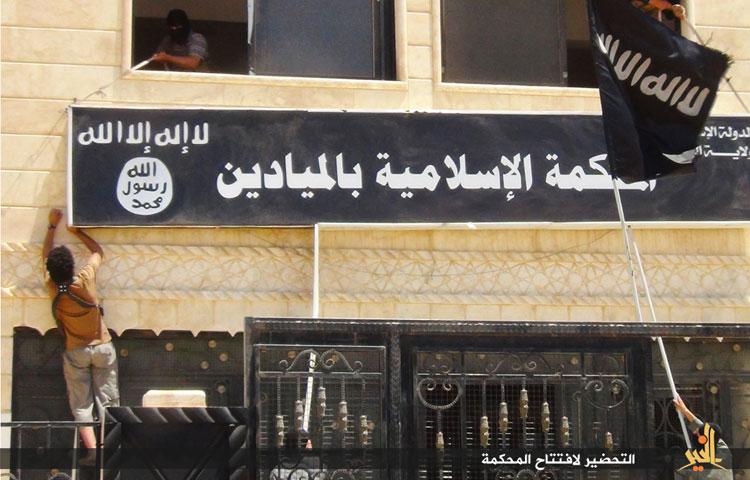On the 18th of November 2012, Al Bukamal and its countryside were liberated from regime forces. The city was in total chaos because of the complete absence of functioning state institutions. This absence pushed people to found local council. Several Sheikhs and Sharia student established the ‘first Sharia board.’ The board coordinated with the local council. Their role was limited to resolving disputes and civil cases.
In that period, the armed factions present in Al Bukamal agreed to manage the board, and the factions did not intervene in the service aspects. Muhammed Khalif, member of the Syrian Network for Human Rights, confirms that until July 2013, the board’s role was limited to the judiciary.
The Sharia board adjudicated in criminal cases. Criminal cases were adjudicated with the implementation of corporal penalties like killing the sentenced in cases of premediated murder and hand amputation in cases of theft.
On the 11th of April 2014, ISIS launched an attack on the city of Al Bukamal. ISIS attacked the building of the Sharia board and released the prisoners. ISIS subsequently took complete control over the whole city on the 27th of June 2014.
The Sharia board in the Western countryside of Deir ez-Zor
The board was founded on the 9th October 2013 in al-Kharita town. It included a number of offices like complaints office and dispute office. Its executive power was formed by all factions. One of the characteristics of this board is that it held offenders from the Free Syrian Army accountable.
Most of the persons working in the board were jurisprudents with the exception of one member who was a lawyer. The board had a role in promoting fighting ISIS.
Since many courts were founded with many judicial references in Deir ez-Zor, a central board was formed in Deir ez-Zor city.
Central Sharia Board in Eastern Region
Sixty percent of boards established in the villages and cities of Deir ez-Zor joined the Central Sharia Board. The main boards were the Judicial Sharia Board in Deir ez-Zor city, the Sharia board in the western countryside of Deir ez-Zor, the Sharia board in Al Bukamal, al-Shadadi in Hasaka countryside, al-Asharaa in Eastern countryside of Deir ez-Zor, and the Higher Sharia board in Deir ez-Zor countryside amongst others.
The central board was formed in mid-2013 and many factions joined it such as al-Nusra Front, Ahrar ash-Sham, Jaysh al-Islam, Jaysh Mueta (Army of Mueta), and several other brigades and battalions present in the region. It thus became the main power in the region and adopted the city of al-Mayadin in the eastern countryside of Deir ez-Zor as its central base.
Islamic Sharia was the only reference followed by the board. It was not affiliated with a specific faction or group. It consisted of independent individuals and some members who are affiliated with military groups, but only as scientific or military character. All the members are degree holders.
The central board played a big role in the region on all levels be it judiciary level, service level, or daawi. Thousands of people came to the board from Deir ez-Zor, Raqqa and Hasaka. The board opened its door for everyone and its offices were activated to run the region. However, when ISIS took control over Deir ez-Zor on the 5th of July 2014, the board’s role was terminated.
We used an unpublished study by Muhammed Khalif, member of Syrian Network for Human Rights.
continue all topic:
Prominent Judicial Bodies Formed in Liberated Syria
The Phase of Regression: ‘Sheikhs’ Replacing Judges
Peoples’ Courts in Autonomous Administrated Regions
Free Independent Syrian Judiciary Council
Three Authority References Warn of the Division of Syria
Syrian State Law: will its continued implementation help maintain the unity of Syrian territory?
Islamic Sharia: Military Brigades Reject Legal References and Insist on the Implementation of Sharia
Judicial Schemes and the Shape of Laws in Areas outside the control of the Syrian Regime
Judiciary in Aleppo is unable to counter the Hegemony of the Military
Rehabilitative Program for Prisoners in Aleppo
Deraa: The Judiciary Scheme, Shape of laws in it since its Liberation
Eastern Ghouta: Foundation of Independent Judiciary following Liberation
Judiciary is absent from Western Ghouta and Sharia Implementation in Qalamoon
Jaysh al-Fateh Promises to implement a Unified Judicial Reference in Idlib
Al-Nusra Front Controls Judiciary in Lattakia Countryside
Hama Countryside: Absence of Judiciary and Subordination of Khan Sheyhun court
Al-Waer court and resolving dispute by consensus in Homs
Judiciary in Deir ez-Zor terminated by ISIS
Attempts at founding Judiciary in Raqqa were terminated by ISIS
Judiciary System under Baath Rule
How do Syrians value courts’ performance and Judiciary in their liberated areas?
Killing Justice in the North of Syria
Higher Judiciary Institute in Aleppo: First Graduates in Liberated Areas
